Diabetes: America's Silent Killer

If there were a deadly disease raging through your body, wouldn't you want to know how to stop it? Unfortunately, more than 6 million Americans are walking around with a silent killer eating away at their health—and they have no idea they're even at risk. That silent killer is diabetes, the fastest-growing disease in history.
It's estimated that 80 million people in the United States have diabetes or are on the verge of developing this disease. Diabetes is particularly prevalent in the African-American community, where it claims nearly 100 lives every single day. "It's time to get out of denial," Oprah says.
Because so many people are affected, the United States is forced to spend $174 billion a year treating this disease—more than AIDS and all cancers combined. "If we don't fix the problem of diabetes in this country, we will bankrupt our future ability to pay for healthcare in the nation," Dr. Oz says.
As a heart surgeon, Dr. Oz says 25 percent of the patients he operates on have diabetes. Still, he says there's hope for anyone who's suffering or at risk. "Most diabetes is preventable," he says. "It is treatable, even reversible."
It's estimated that 80 million people in the United States have diabetes or are on the verge of developing this disease. Diabetes is particularly prevalent in the African-American community, where it claims nearly 100 lives every single day. "It's time to get out of denial," Oprah says.
Because so many people are affected, the United States is forced to spend $174 billion a year treating this disease—more than AIDS and all cancers combined. "If we don't fix the problem of diabetes in this country, we will bankrupt our future ability to pay for healthcare in the nation," Dr. Oz says.
As a heart surgeon, Dr. Oz says 25 percent of the patients he operates on have diabetes. Still, he says there's hope for anyone who's suffering or at risk. "Most diabetes is preventable," he says. "It is treatable, even reversible."
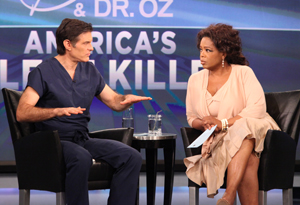
There are two types of diabetes: type 1 and type 2.
Type 1 diabetes, formerly known as juvenile diabetes, affects 10 percent of Americans diagnosed with diabetes. "[You're] not making enough insulin. That's generally from genetic reasons because your pancreas just doesn't work correctly," he says. "Type 1 has nothing to do to prevent it from happening. There's a lot we can do to treat you once it happens."
Type 2 develops from lifestyle issues. "[Patients] have a lot of belly fat and the like, and they have enough insulin," he says. "But it's not listening anymore because the belly fat has poisoned the ability of insulin to work, so the sugar is still floating around because it can't find a partner to get into your tissues."
Though type 2 affects most of the population, Dr. Oz says it's the most treatable. Patients just have to start making better lifestyle choices. "Ninety percent of type 2 diabetics can actually reverse their problem," he says.
Type 1 diabetes, formerly known as juvenile diabetes, affects 10 percent of Americans diagnosed with diabetes. "[You're] not making enough insulin. That's generally from genetic reasons because your pancreas just doesn't work correctly," he says. "Type 1 has nothing to do to prevent it from happening. There's a lot we can do to treat you once it happens."
Type 2 develops from lifestyle issues. "[Patients] have a lot of belly fat and the like, and they have enough insulin," he says. "But it's not listening anymore because the belly fat has poisoned the ability of insulin to work, so the sugar is still floating around because it can't find a partner to get into your tissues."
Though type 2 affects most of the population, Dr. Oz says it's the most treatable. Patients just have to start making better lifestyle choices. "Ninety percent of type 2 diabetics can actually reverse their problem," he says.
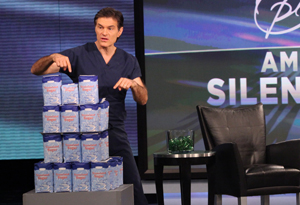
Diabetes, particularly type 2, is the fastest-growing disease in history because of one thing—sugar. Dr. Oz says the average person eats 150 pounds of sugar a year. "That's 40 pounds of extra sugar that we're eating every single year as opposed to just a generation ago," he says. "It is impossible for our body to keep up with that. There is no way we can adapt this quickly."
Sugar often becomes an addiction, Dr. Oz says. "When you go to a store to buy food, when you go to a supermarket, to a restaurant, and you get a little bit of sugar, it stimulates the same part of your brain as crack cocaine," he says. "It just turns you on."
Even if you try to control your intake, Dr. Oz says sugar is often hidden in products you wouldn't expect. "It's hidden in our condiments," he says. "It's hidden in our salad dressing."
Watch Bob Greene's surprising expose on hidden sugars
Sugar often becomes an addiction, Dr. Oz says. "When you go to a store to buy food, when you go to a supermarket, to a restaurant, and you get a little bit of sugar, it stimulates the same part of your brain as crack cocaine," he says. "It just turns you on."
Even if you try to control your intake, Dr. Oz says sugar is often hidden in products you wouldn't expect. "It's hidden in our condiments," he says. "It's hidden in our salad dressing."
Watch Bob Greene's surprising expose on hidden sugars
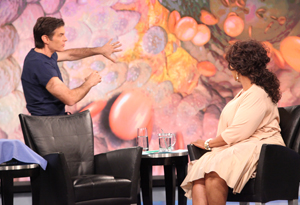
Dr. Oz says one of the major misconceptions about diabetes is that it's only a sugar problem. The truth is, you do need some sugar.
Your body uses sugar (also called simple carbohydrates) to help the brain think and keep muscles moving. When you eat, your food goes through a digestive process that separates sugar and glucose from the rest. That sugar makes its way into your bloodstream. In a healthy body, the pancreas releases insulin, a hormone which helps funnel sugar from the bloodstream to tissues that need it.
Watch Dr. Oz's animation of what diabetes does to your body.
However, too much sugar can be a serious problem. "We store it in our belly," Dr. Oz says. "But that belly fat, the omentum, gets ponderously large. And as it does that, it poisons the insulin so it no longer can work and the sugar cannot get out of the bloodstream."
This causes issues for the heart. "The blood vessels are very delicate," he says. "The sugar is like pieces of glass shard scraping at it."
These shards leave small holes on the inside of the artery. "Our body scars in an attempt to heal it. It's a fragile repair," Dr. Oz says. "It breaks; it ruptures. Now you have an open surface that's sore."
As a scab forms over that sore, Dr. Oz says it gets larger and hardens the arteries—leading to a heart attack. "A diabetic will most likely die from a heart attack," he says.
See how diabetes can affect your heart
Your body uses sugar (also called simple carbohydrates) to help the brain think and keep muscles moving. When you eat, your food goes through a digestive process that separates sugar and glucose from the rest. That sugar makes its way into your bloodstream. In a healthy body, the pancreas releases insulin, a hormone which helps funnel sugar from the bloodstream to tissues that need it.
Watch Dr. Oz's animation of what diabetes does to your body.
However, too much sugar can be a serious problem. "We store it in our belly," Dr. Oz says. "But that belly fat, the omentum, gets ponderously large. And as it does that, it poisons the insulin so it no longer can work and the sugar cannot get out of the bloodstream."
This causes issues for the heart. "The blood vessels are very delicate," he says. "The sugar is like pieces of glass shard scraping at it."
These shards leave small holes on the inside of the artery. "Our body scars in an attempt to heal it. It's a fragile repair," Dr. Oz says. "It breaks; it ruptures. Now you have an open surface that's sore."
As a scab forms over that sore, Dr. Oz says it gets larger and hardens the arteries—leading to a heart attack. "A diabetic will most likely die from a heart attack," he says.
See how diabetes can affect your heart

Dr. Oz says this dangerous scarring takes place in all other body tissues. "That's a problem because that influences all of our organs."
For that reason, Dr. Oz says diabetics are at high risk of kidney failure."Here's a picture of a normal kidney on the left. Beautiful. Plump. Robust," he says. "Look at the kidney on the right. It's shrunken. It's shriveled. It's been killed. That's a diabetic kidney."
For that reason, Dr. Oz says diabetics are at high risk of kidney failure."Here's a picture of a normal kidney on the left. Beautiful. Plump. Robust," he says. "Look at the kidney on the right. It's shrunken. It's shriveled. It's been killed. That's a diabetic kidney."

Diabetes can also affect the way you see the world. "In the eyes, the blood vessels are very fragile," he says. "Those fragile little vessels crack. A little tiny crack in a big vessel, and the blood accumulates."
As the blood accumulates, you aren't able to see as much as you did before. "Do you see those dark areas? That's a charley horse in the eye," he says. "That's your view of the world. ... It's not just a little bit of sugar."
As the blood accumulates, you aren't able to see as much as you did before. "Do you see those dark areas? That's a charley horse in the eye," he says. "That's your view of the world. ... It's not just a little bit of sugar."
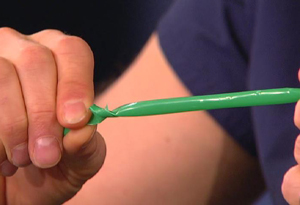
In the United States, approximately 86,000 diabetes-related amputations are performed every year.
In severe cases, a diabetic's blood vessels look like bent straws that cut off blood flow to the legs. "The diabetes causes scarring on the inside and basically kinks it off. It kinks it off in multiple places so we can't even get around them," he says. "You can't fix that if you're a doctor."
The condition can reduce your ability to fight infections in your lower extremities by shutting off the supply of white blood cells, Dr Oz says. "[In] a lot of diabetes [cases], the first time they know they've got a problem is they get an infection in their toe. They don't feel their toe so well because it affects their nerves, and so they end up losing their feet."
An amputee's plea to those with diabetes
In severe cases, a diabetic's blood vessels look like bent straws that cut off blood flow to the legs. "The diabetes causes scarring on the inside and basically kinks it off. It kinks it off in multiple places so we can't even get around them," he says. "You can't fix that if you're a doctor."
The condition can reduce your ability to fight infections in your lower extremities by shutting off the supply of white blood cells, Dr Oz says. "[In] a lot of diabetes [cases], the first time they know they've got a problem is they get an infection in their toe. They don't feel their toe so well because it affects their nerves, and so they end up losing their feet."
An amputee's plea to those with diabetes

Dr. Oz says the symptoms for both types of diabetes are straightforward:
Constant thirst and frequent urination: These are the first things doctors will ask you about. "You have [constant thirst] because you're urinating all the time," he says. "The sugar gets into your urine, and it actually drags it through your kidneys. It fools your kidneys."
Non-healing infections: "The white blood cells that protect the immune system can't get there," he says. "And by the way, your white cells don't function normally. Your whole immune system's depressed because you're waging a constant civil war against your body, which has the sugar scraping away on the inside."
Tingling toes: "Nerves have a cable around them," Dr. Oz says. "That cable gets broken with diabetes, so you end up with short circuits of your nerve system."
Blurred vision: "You're having little bleeds in the back of your eye," he says.
Constant thirst and frequent urination: These are the first things doctors will ask you about. "You have [constant thirst] because you're urinating all the time," he says. "The sugar gets into your urine, and it actually drags it through your kidneys. It fools your kidneys."
Non-healing infections: "The white blood cells that protect the immune system can't get there," he says. "And by the way, your white cells don't function normally. Your whole immune system's depressed because you're waging a constant civil war against your body, which has the sugar scraping away on the inside."
Tingling toes: "Nerves have a cable around them," Dr. Oz says. "That cable gets broken with diabetes, so you end up with short circuits of your nerve system."
Blurred vision: "You're having little bleeds in the back of your eye," he says.
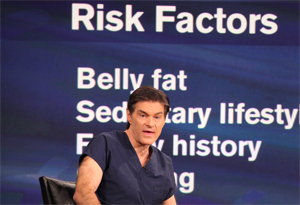
Dr. Oz says there are four major risk factors for type 2 diabetes:
Belly fat: A big belly is the number one risk factor in America, and Dr. Oz has a simple test to see if you have too much: "If your waist size, measured at your belly button is more than half of your height, then you've got too much belly and you're at risk for diabetes."
Sedentary lifestyle: Physical activity is key to preventing or reversing diabetes. "When you exercise and do muscle-building work, the muscle actually becomes more sensitive to insulin," he says. "The insulin can work better. It can drive the sugar where it's supposed to go."
Family history: "If you've got relatives who have diabetes or if you had diabetes when you were pregnant, big warning signs."
Smoking: Cigarettes not only harm your lungs, "it kills your pancreas," Dr. Oz says.
Belly fat: A big belly is the number one risk factor in America, and Dr. Oz has a simple test to see if you have too much: "If your waist size, measured at your belly button is more than half of your height, then you've got too much belly and you're at risk for diabetes."
Sedentary lifestyle: Physical activity is key to preventing or reversing diabetes. "When you exercise and do muscle-building work, the muscle actually becomes more sensitive to insulin," he says. "The insulin can work better. It can drive the sugar where it's supposed to go."
Family history: "If you've got relatives who have diabetes or if you had diabetes when you were pregnant, big warning signs."
Smoking: Cigarettes not only harm your lungs, "it kills your pancreas," Dr. Oz says.

Out of the 85 million people who have been diagnosed with diabetes, the African-American community has been hit particularly hard. Dr. Oz says the biggest reason is lack of access to affordable, healthy food. "The cheapest calories in America are the calories with no nutrients," Dr. Oz says. "So especially among the young, in their neighborhoods they can't get the foods they need to be able to eat, and the foods they need are expensive. The Hispanic [population is] very hard hit for the same reason."
Dr. Ian Smith, the medical and diet expert behind the 50 Million Pound Challenge, says the obesity epidemic has spiraled out of control. African Americans are twice as likely to have type 2 diabetes, develop end-stage kidney disease, have amputations and die from the disease. "African-Americans are facing an obesity crisis," he says. "It's literally killing us."
Dr. Smith says part of the problem lies with bad habits. "Habits are tough to break, especially for African-Americans when their habits are around food, which is like a culture for them," he says. "Food is love and comfort."
Another major battle is attitudes toward eating and exercising. "Transgenerationally, we've eaten this way, and African-Americans take this 'heels in the ground' approach," he says. "This is a disease often about attitude, and attitude has a lot to be desired right now. We have to improve our attitudes about it."
Dr. Ian Smith, the medical and diet expert behind the 50 Million Pound Challenge, says the obesity epidemic has spiraled out of control. African Americans are twice as likely to have type 2 diabetes, develop end-stage kidney disease, have amputations and die from the disease. "African-Americans are facing an obesity crisis," he says. "It's literally killing us."
Dr. Smith says part of the problem lies with bad habits. "Habits are tough to break, especially for African-Americans when their habits are around food, which is like a culture for them," he says. "Food is love and comfort."
Another major battle is attitudes toward eating and exercising. "Transgenerationally, we've eaten this way, and African-Americans take this 'heels in the ground' approach," he says. "This is a disease often about attitude, and attitude has a lot to be desired right now. We have to improve our attitudes about it."
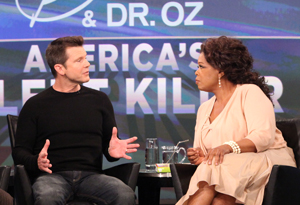
Fitness expert Bob Greene says physical activity can literally save the life of someone at risk for diabetes. "When it comes to diabetes, we know that if you simply get 30 minutes a day, your risk is lowered by 60 percent," he says. "Exercise is not negotiable."
Diabetes is a disease close to Bob's heart. "Both of my parents have diabetes," he says. "Through lifestyle, you can change your risk and, in most cases, prevent this disease."
Incorporating exercise into your life doesn't have to be overwhelming. Bob says two simple activities can reduce your risk, weight and symptoms dramatically:
Diabetes is a disease close to Bob's heart. "Both of my parents have diabetes," he says. "Through lifestyle, you can change your risk and, in most cases, prevent this disease."
Incorporating exercise into your life doesn't have to be overwhelming. Bob says two simple activities can reduce your risk, weight and symptoms dramatically:
- Walk 30 minutes a day.
- Start strength training. "This can be done with bands or weights. My favorite is dumbbells," he says. "Maintaining the muscles and the joints is so important in combating diabetes because it raises your metabolism."

Dr. Oz and Dr. Smith have one message for anyone who thinks they may be at risk for diabetes: Don't wait to get tested. "Almost always you can reverse it," Dr. Oz says. "What you can't always reverse are the side effects of what that glass shrapnel has already done inside of you."
If you already have diabetes, make sure you are on top of your condition. "Diabetes is years and years and so you don't feel the immediate effect of it, and that's why people say, 'I'll make a change tomorrow,'" Dr. Smith says. "Why wait until it's a crisis situation? Wait until the doctor says that you have to take insulin or you're going to have an amputation? Do something about it now."
Your guide to testing blood sugar
Art Smith's diabetes wake-up call
Everything you need to know about diabetes
If you already have diabetes, make sure you are on top of your condition. "Diabetes is years and years and so you don't feel the immediate effect of it, and that's why people say, 'I'll make a change tomorrow,'" Dr. Smith says. "Why wait until it's a crisis situation? Wait until the doctor says that you have to take insulin or you're going to have an amputation? Do something about it now."
Your guide to testing blood sugar
Art Smith's diabetes wake-up call
Everything you need to know about diabetes



